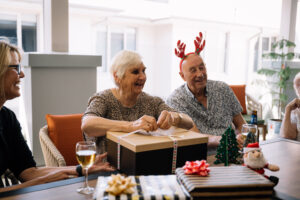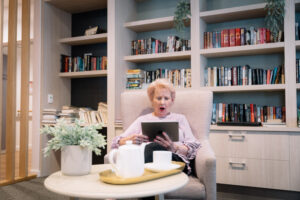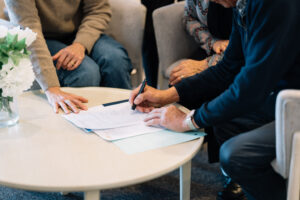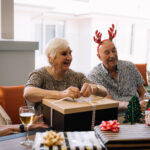This Week 2nd – 8th August is National Stroke Week. Stroke is a leading killer and cause of permanent disability in the elderly in Australia. The awareness message is that a stroke can happen to anyone at any time. Knowing the F.A.S.T. action can help to save lives:
Face – Check their face. Has their mouth drooped?
Arms – Can they lift both arms?
Speech – Is their speech slurred? Do they understand you?
Time – Time is critical. If you see any of the above signs call 000 straight away.
When a stroke occurs more than 1.9 million brain cells die each minute because the brain doesn’t get the blood supply it needs. Every stroke is different in how it affects the individual. It can affect a person’s body, their emotions, and the way they think. It can cause muscle weakness, and problems with speaking, memory, hearing or vision.
Signs of a Stroke:
- Face drooping.
- Speech difficulty.
- Loss of vision, sudden blurring or decreased vision in one or both eyes.
- Difficulty swallowing.
- Loss of balance.
- Sudden dizziness.
- Loss of consciousness.
- Sudden numbness or weakness in the arm, leg, face or one side of the body.
- A sudden severe headache.
- Seizures.
- Nausea.
- Agitation.
- Shortness of breath.
If your loved one shows any of these symptoms, even if they don’t last, you need to get immediate medical attention. Time is of the essence in reducing the effects of a stroke. Some people, however, may show none of the signs of having a stroke.
A stroke can happen in two main ways. An Ischaemic Stroke is caused by a blood clot or plaque. Haemorrhagic Strokes are caused by a break in the blood vessel in the brain. The treatment for a stroke will depend on the severity of the stroke. A number of hospitals have a stroke unit, with a specialised stroke team. Your loved one’s team of health care professionals will determine the road to recovery, based on the severity of the stroke.
Stroke Recoveries:
At Homestyle we support many residents who have suffered a stroke. At our Rowville Manor Residence, we have a full rehabilitation gym on site that has helped many residents with their recovery. Meet Anne who after a stroke in 2020 was initially told she would never walk again. After just a few weeks of rehabilitation with the Concentric Team at Rowville, a leading Physiotherapy and Allied Health provider, Anne’s mobility increased and over time she added more goals such as making a cup of tea for herself. Eventually Anne’s persistence and hard work paid off and she was able to return home!
One of our residents, Nola moved into our Rowville Manor home late 2020 after suffering a stroke, as her care needs were deemed too high for her to return home. When Nola first began rehab she required full staff assistance to stand and was unable to walk at all. Nola was determined to prove her doubters wrong and walk again. Nola worked hard with the occupational therapy team. Her sheer determination and tenacity paid off, with Nola now being able to walk short distances with a walking frame, as well as manage car transfers so she can go out.
Anne and Nola are just two of many stories of recovery from living with stroke in our homes.
For more information about strokes visit the Stroke Foundation.
If you would like to know more about our rehabilitation programs after suffering a stroke, or further information about short-term or long-term accommodation, you can phone us on 1300 104 663 or contact us here.






